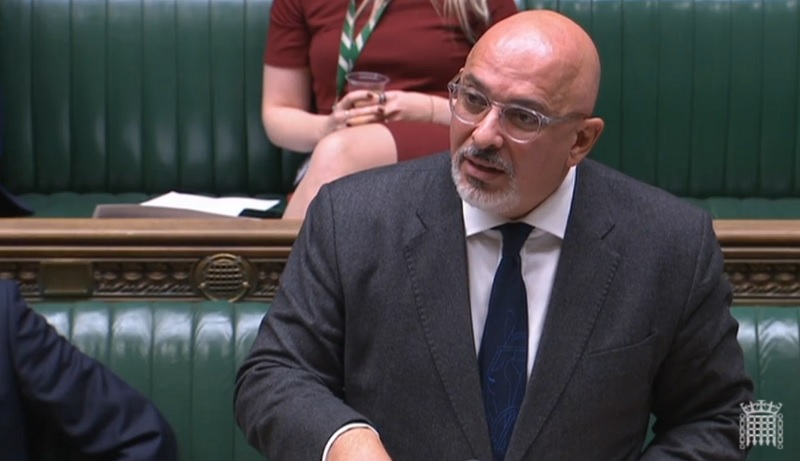Plans to start removing funding for most BTECs and other applied general qualifications from 2023 will be delayed by a year, the education secretary has announced.
Nadhim Zahawi also revealed tonight that the exit requirements for English and maths in T Levels will be removed.
During the second reading of the Skills and Post-16 Education Bill to the House of Commons this evening, he told MPs: “I am clear that T Levels and A-levels should be front and centre of the level 3 landscape.
“But I am also convinced that we need other qualifications alongside them – many of which currently exist – that play a valuable role in supporting good outcomes for students. It is quite likely we will see many BTECs and other similar applied general style qualifications continuing to play an important role in 16 to 19 education, for the foreseeable future.
“Our reforms to the qualifications landscape are rightly ambitious, but we know that we would be wrong to push too hard and risk compromising quality. That is why I am announcing today that we have decided to allow an extra year before our reform timetable is implemented.”
It means that qualifications affected by the cull will now not be defunded until 2024 at the earliest, compared to the original plan of 2023.
The announcement will be seen as a win for the Protect Student Choice campaign, a coalition of FE and skills sector organisations led by the Sixth Form Colleges Association, which has been calling for the plans to be reversed or at least slowed down.
Many MPs and Lords have also backed the call of the campaign in recent months, which has led to the new Department for Education ministerial team softening their language around the reforms.
Zahawi said tonight that this extra year will “allow us to continue to work hard to support the growth of T Levels and gives more notice to providers, awarding organisations, employers, students and parents so that they can prepare for the changes”.
Bill Watkin, chief executive of the Sixth Form Colleges Association, said he was “pleased” by the delay but added it is “vital the government uses this extra year to develop a transparent process for determining the future of these qualifications that involves providers, students and employers”.
Association of Colleges chief executive David Hughes also welcomed the announcement, saying it shows the education secretary “has been listening and examining the evidence”.
In his speech, Zahawi also announced the requirement for T Level students to reach level 2 in English and maths by the end of their course will be watered down.
He said the Department for Education hears “consistently” that some students are being put off taking a T Level because of the rule.
“I can also announce today that we will remove the English and maths exit requirement from T Levels,” he told MPs.
“This will bring them in line with other qualifications, including A-levels, and ensure talented young people with more diverse strengths are not arbitrarily shut out from rewarding careers in sectors such as construction, catering and health-care. The Institute for Apprenticeships and Technical Education is taking immediate steps towards this.”
Following a two-stage level 3 and below review, launched in March 2019, the DfE announced last July it would strip public funding from “poor quality” qualifications which overlap with T Levels or A-levels.
The department’s response to the review consultation revealed that BTEC qualifications would become “rare” once it begins phasing in a new “streamlined” system for level 3 courses from 2023.
Watkin said that funding should not be withdrawn for any BTEC “unless there is clear evidence that the qualification is not valued by students or employers.
“An evidence-based approach, involving those directly involved in delivery, is essential if we are to have a qualification system that works for everyone.”
Hughes added: “Delaying defunding gives more time for greater evaluation of T levels and how they work in the new landscape of qualifications.
“I want all pathways, including T levels to be a success and to be as accessible to as many students as possible. Removing the English and maths GCSE exit requirement in all T levels and the extra flexibilities on industry placements announced last week will open up these new qualifications to many more students.”

















Don’t let them fob you off with small gestures. It shows the approach is floored. 86% of consultation respondents told them this and we were ignored. Push for me. Not one recognition of the impact statement just a change to English and maths as this will help mask those disadvantaged stats. Keep talking to MPs. Show the facts and the impact on their constituents and why officials are out of touch. Above all show a united front. Well done the sixth form colleges association and others and protect student choice. I wonder what could have been achieved had the AoC had concerned itself more with its members and not it’s standing in the DfE. Food for future thought when the membership fees go up?